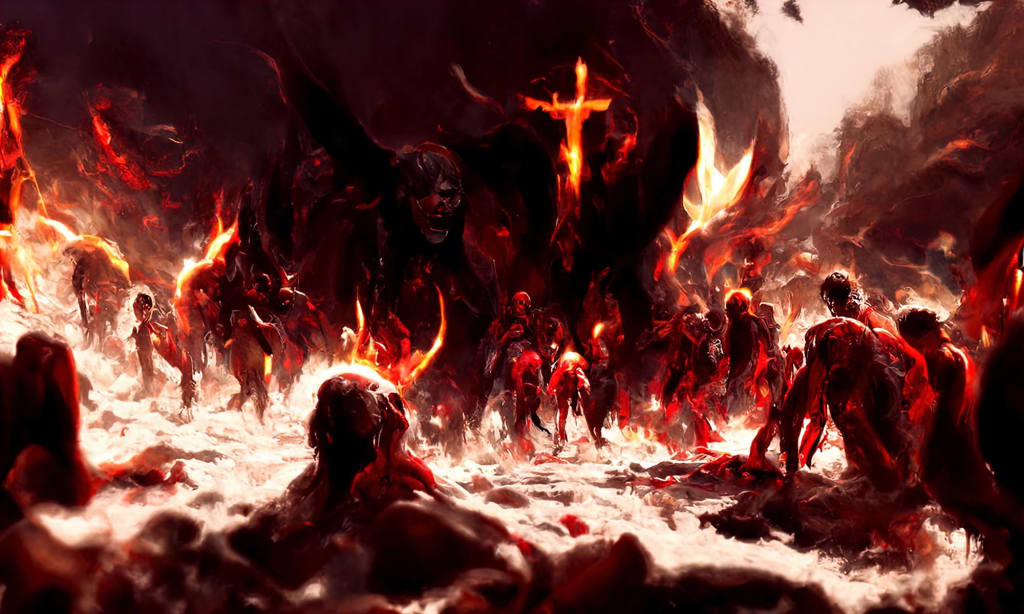
Fallen angels have captivated the imagination of humans for centuries. These supernatural beings are believed to have once been angels who rebelled against God and were cast out of heaven. In many religions, fallen angels are considered to be evil, and their stories have been told in countless myths, legends, and works of fiction. In this article, we will explore the concept of fallen angels and their significance in various religions and cultures.
The concept of fallen angels can be traced back to the Judeo-Christian tradition. In the Bible, fallen angels are referred to as "the Watchers" and are described as angels who were sent to earth to watch over humans. However, they became corrupt and began to teach humans forbidden knowledge, such as magic and divination. As a result, God punished them by casting them out of heaven and condemning them to eternal damnation.
In Christianity, fallen angels are often associated with Satan, the embodiment of evil. According to Christian tradition, Satan was once an angel named Lucifer who rebelled against God and was cast out of heaven. Lucifer is often depicted as a fallen angel with a dark, sinister appearance, tempting humans to sin and leading them away from God.
In Islam, the concept of fallen angels is similar to that of Christianity. According to Islamic tradition, Iblis (also known as Shaytan) was once an angel who refused to bow down to Adam, the first human, and was cast out of heaven as a result. Iblis is considered to be the embodiment of evil and is often depicted as a fallen angel with horns and a tail.
The idea of fallen angels has also been explored in popular culture, such as in movies, TV shows, and books. For example, the TV show "Supernatural" features two brothers who hunt demons, including fallen angels who have possessed human bodies. In the book "Paradise Lost" by John Milton, the story of Satan's rebellion against God is told from the perspective of the fallen angels.
Despite their association with evil, fallen angels also have a deeper symbolic meaning. In some interpretations, they represent the human desire for knowledge and independence. By rebelling against God, the fallen angels were seeking to break free from their subservient role and assert their own will. This can be seen as a metaphor for the human struggle for autonomy and self-determination.
In conclusion, the concept of fallen angels has been a fascinating and enduring part of human mythology and religious tradition. Whether seen as symbols of evil or rebellion, they continue to captivate the imagination and inspire new stories and interpretations.
1. The Origins and Nature of Fallen Angels in Judeo-Christian Tradition
Fallen angels have long been a fascinating subject for theologians, scholars, and ordinary people alike. In this article, we explore the origins and nature of fallen angels in Judeo-Christian tradition. We examine the biblical accounts of fallen angels and their characteristics, as well as their role in shaping our understanding of evil and free will. We also consider the theological implications of the idea of fallen angels, including questions of divine justice, human responsibility, and redemption.
2. The Role of Fallen Angels in Popular Culture
From Milton's "Paradise Lost" to the "Supernatural" TV series, fallen angels have played a significant role in popular culture. In this article, we explore the ways in which fallen angels have been portrayed in literature, film, and television. We consider the themes and motifs that underlie these portrayals, such as the struggle between good and evil, the nature of temptation, and the human desire for autonomy. We also discuss the impact of these representations on our cultural imagination and understanding of the supernatural.
3. The Significance of Fallen Angels in Islamic Tradition
While the idea of fallen angels is most commonly associated with Christianity, it also plays an important role in Islamic tradition. In this article, we examine the Islamic understanding of fallen angels, including their origins, nature, and role in shaping human history. We also explore the ways in which the concept of fallen angels is intertwined with other Islamic beliefs, such as the nature of the soul, the reality of jinn, and the ultimate destiny of human beings. Finally, we consider the lessons that can be drawn from the Islamic conception of fallen angels, including the importance of humility, obedience, and moral responsibility.
4. Fallen Angels in Gnostic and Other Esoteric Traditions
The idea of fallen angels has also been explored in various esoteric and mystical traditions, including Gnosticism, Kabbalah, and Hermeticism. In this article, we examine the significance of fallen angels in these traditions, including their symbolic meanings, their relationship to other spiritual entities, and their role in spiritual evolution. We also consider the similarities and differences between the Judeo-Christian and esoteric understandings of fallen angels, as well as their implications for our understanding of the human condition and the nature of the universe.
About the Creator
Enjoyed the story? Support the Creator.
Subscribe for free to receive all their stories in your feed. You could also pledge your support or give them a one-off tip, letting them know you appreciate their work.





Comments
There are no comments for this story
Be the first to respond and start the conversation.